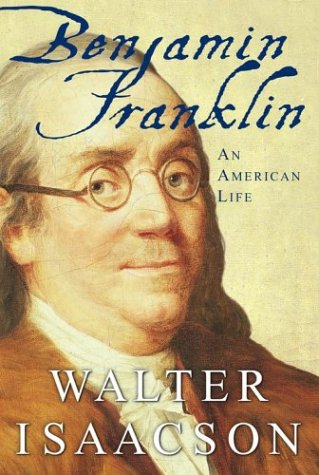Book Notes
 Walter Isaacson, Benjamin Franklin; An American Life (New York: Simon and Shuster, 2003).
Walter Isaacson, Benjamin Franklin; An American Life (New York: Simon and Shuster, 2003).
The last few years have witnessed a spate of biographies on our founding fathers: George Washington by James Flexner (1994), Thomas Jefferson by Joseph Ellis (1998), John Adams by David McCullough (2002), James Madison by Jack Rakove (2001) and Gary Wills (2002), and Alexander Hamilton by Ron Chernow (2004). Ben Franklin (1706–1790) is the subject of at least three important new works, this one by Isaacson, HW Brand's The First American: The Life and Times of Benjamin Franklin (2002), and Gordon Wood's The Americanization of Benjamin Franklin (2004). Franklin was a paradox in many ways. He was more pragmatic than profound, and yet he might have been our most influential diplomat and founding father (the only one to sign all four of our founding documents: the Declaration of Independence, the treaty with France, the peace agreement with Britain, and the Constitution. See page 459). He extolled the virtue of honoring God by doing good to your fellow man, but he estranged himself from nearly everyone in his immediate family. He exalted the modesties befitting the emerging middle class and disdained extravagance, but was wealthy enough to retire at age 42 and held court with Voltaire and King Louis XVI. He was a deist of sorts famous for tolerance and yet one with with a fervent belief in a benevolent God. I was intrigued to learn that Franklin was an ardent admirer of the famous preacher George Whitefield. Nearly half the books that Franklin printed between 1739 and 1741 were either by or about Whitefield, and for forty years, until Whitefield died, they corresponded. In his closing pages Isaacson reviews the ebb and flow of Franklin's reputation. At 500 pages this is a long book, but an eminently readable one about a fascinating person.


